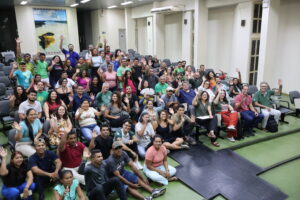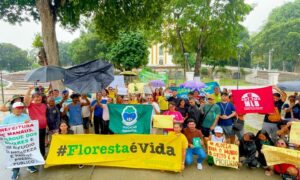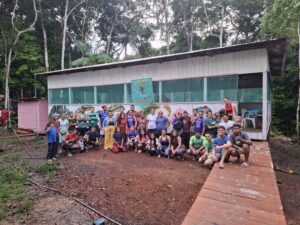Instituto Juruá, in partnership with member organizations of the Coletivo do Pirarucu (Arapaima Collective), celebrate the achievement of Fair Trade USA certification by ASPROC – an initiative promoted by the export project The Fish of Change.
By Nathália Messina
Translated by Laiane Lessa and Kirsten Silvius
The Amazon, home to some of the planet’s greatest biodiversity levels, is witnessing a significant shift in international fish trade. In 2024, sales of managed, wild-caught arapaima fish (known as pirarucu in Brazil) produced by indigenous and riverine communities in the Brazilian Amazon will expand to overseas markets, with the prospect of improving income for those involved in the species’ management.
The result of a collaboration among multiple organizations, The Fish of Change arapaima export project has a strategic partnership with the United States Forest Service – (USFS). The project is implemented collaboratively by organizations of the Coletivo do Pirarucu (Arapaima Collective), such as the Association of Rural Producers of Carauari (ASPROC), which is responsible for trade coordination of the Gosto da Amazônia and Taste of Amazon collective brands; Instituto Juruá as project manager; Chico Mendes Memorial, which represents and administers projects on behalf of rubber tappers and traditional forest-based communities in Brazil; Mamirauá Sustainable Development Institute (IDSM); Native Amazonian Operation (OPAN); and the Rio de Janeiro Syndicate of Bars and Restaurants (SindRio), which promotes pirarucu sales at the national scale. For distribution and insertion of the fish into the international market, we collaborate with the Blueyou Group.
“Now, by having the Fair Trade Certified seal, we take an important step in valuing standing forest, healthy rivers, providing visibility and fair compensation for communities through products that make this possible. This project is a great example of the impact of work conducted with various partnerships, including social organizations, government agencies, community-based associations and the private sector,” says Jayleen Vera, manager for the USFS Brazil program.
For certification, the project team decided to work with Fair Trade USA (FTUSA) – an NGO founded in 1998 and the main independent certifier of Fair Trade products in the US. Focusing on agricultural, fishing and manufacturing markets, Fair Trade USA seeks to promote conscious consumer behavior and mutually beneficial trade for all parties involved.
The certification process, centered on the Capture Fisheries Standard (CFS), covers nine modules ranging from empowerment managers to labor issues, natural resources management, transparency and the promotion of an internal system for improvement of the certificate holder’s management practices, in this case ASPROC.
Audits are conducted annually by an independent entity authorized by FTUSA, denominated a “Compliance Body’” which verifies compliance with the CFS. In November 2023, ASPROC underwent its first audit for fair trade of arapaima. The audit process was supported by Instituto Juruá and conducted by SCS Global Services in the community of Lago Serrado, which is part of the Carauari fishing agreement area.

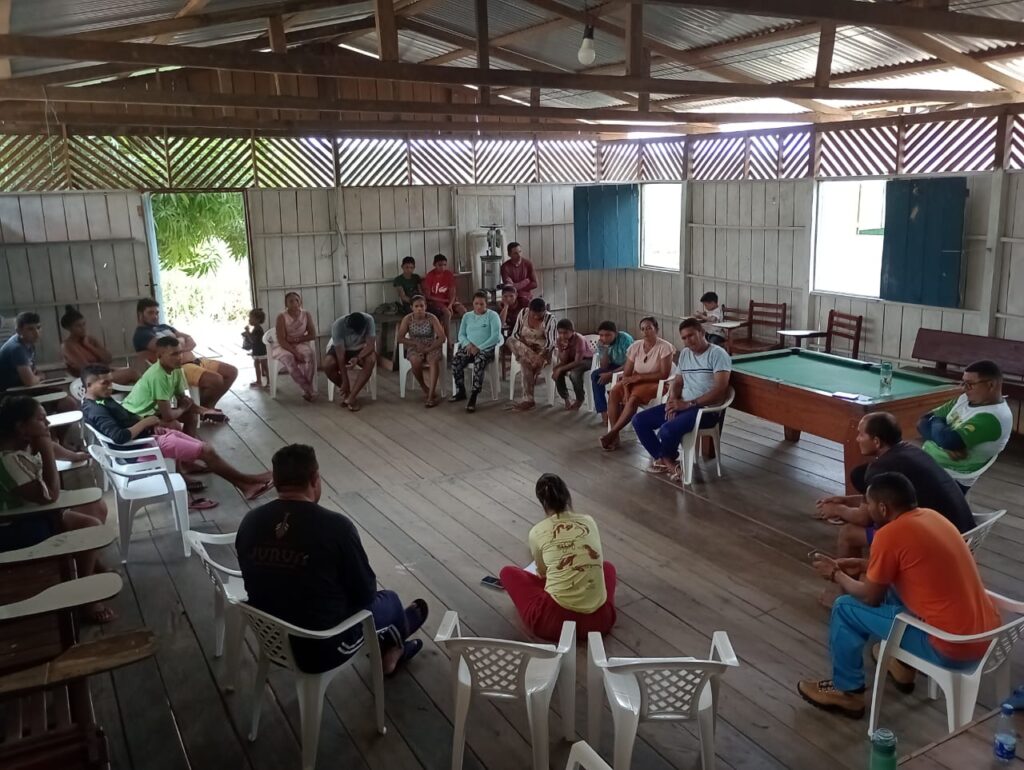
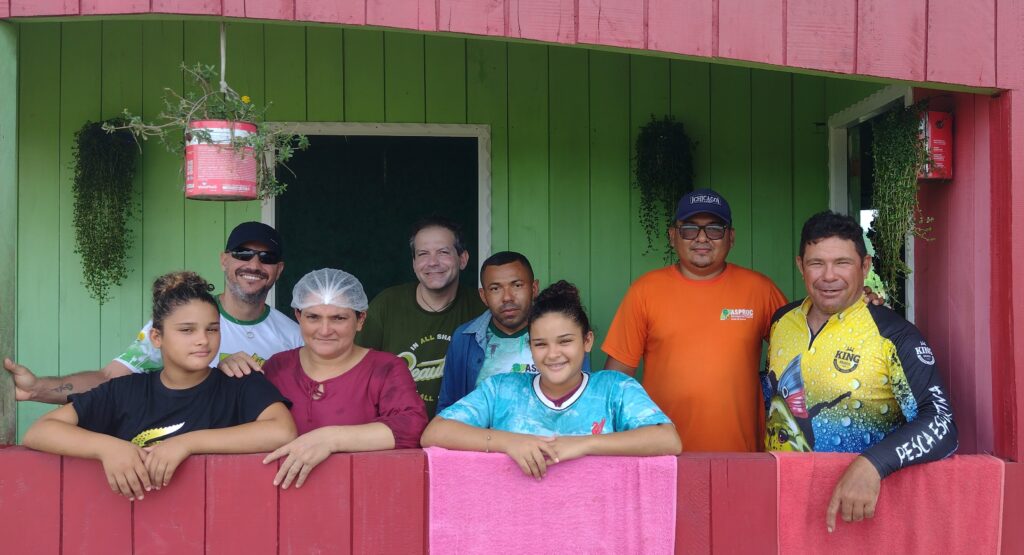

With only 20 non-conformities in Critical Criteria and 3 in Progress Criteria, within an overall framework of over 200 criteria, ASPROC has affirmed its commitment to Fair Trade USA and has been working to adjust the non-conformities, in their majority related to documentation.
Now, with the certification granted and valid for 3.5 years, ASPROC is able to sell its products with the Fair Trade Certified seal (photo/illustration). According to Eude Santiago, ASPROC production coordinator, the certification is meaningful to the association, as it showcases community leadership. “It reflects our and our partners’ choices in responsibly and sustainably conducting community-based business. This model demonstrates a greater transparency, and brings confidence to our consumers,” said the coordinator.

Photo by Rodrigo Azevedo ( Gosto da Amazônia). The Fair Trade logo overlays the photo.
The certification process is continuous, and the association is currently in the phase between Years Zero and One, implementing new standards and meeting the evolving criteria of the CFS to improve and qualify the work year after year.
In an interview with Producer Services representatives of the Fair Trade USA Brazil and Colombia teams, Milena Tomas and Pilar Herrón, we asked about the main challenges that ASPROC can expect to face with the maintenance and development of the certification program. They told us they believe the main challenges will include:
a) Consolidating the organizational structure of communities that already have a basic structure, to guarantee participatory decisions related to the use of the fair trade premium that will be received from the sale of certified arapaima.
b) Committing to the continuous improvement of handling and processing practices for fish production, to attain and maintain the high quality standards demanded by consumers of certified products worldwide.
c) Actively maintaining data collection on fish captures and management practices (for example, use of authorized capture practices, recording accidents, etc.), to ensure the health of the arapaima populations and the health and safety of the fishers.
ASPROC’s achievement is remarkable, becoming the first organization to certify the management of arapaima, a pioneering product among the agriculture and fishing products of Fair Trade USA. This is a crucial milestone for freshwater fisheries, encouraging ethical and sustainable practices in the Amazon context. It is also a milestone at the national level, because arapaima is the first fisheries product certified by Fair Trade USA in Brazil, as Milena and Pilar explained:
“For Fair Trade USA, it is highly significant that our Capture Fisheries Standard is helping indigenous and riverine communities in the Brazilian Amazon receive not only market recognition, but also economic incentives that will help the fishers, their families and their communities… Furthermore, this is the first certification obtained in Brazil in the context of the FTUSA fisheries program; we are thrilled to think that, as pioneers, ASPROC will stimulate other brazilian fishers and fish managers to adhere to the Fair Trade movement. It is also a great opportunity for our commercial partners and consumers, who value the Fair Trade concept, to contribute to Amazonian conservation and to the socioeconomic wellbeing of its ancestral dwellers by buying FTUSA certified arapaima fish.”
The Fair Trade Certified seal is one more initiative that attests to the social and ecological value of arapaima management in Brazil. By choosing fair-trade certified products, consumers become agents of change, valuing the conservation work that managers perform in the Amazon, and encouraging trade based on ethical principles.

